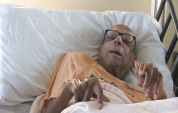6:25 | Five years after he graduated high school during the Depression, Lyle Gittens finally got a good job at the YMCA. He wanted to be a basketball coach but he lacked a degree. He was a talented player and he went south to join the team at Clark University in Atlanta, where he encountered two things he never experienced before, segregation and southern hospitality.
Keywords : Lyle Gittens YMCA City College New York City basketball coach Clark Atlanta University Atlanta GA segregation Black African-American

Harlem in the Roaring Twenties was a great time. Then came the crash. It meant that Lyle Gittens' father was out of work and the immigrant from Barbados, like all the men in the neighborhood, was unable to support his family.
Back in Harlem, Lyle Gittens played stickball and baseball. When he moved to the Lower East Side, there was a new game, basketball, or, the way it was played there, murder basketball.
Lyle Gittens had just arrived from New York City and was looking forward to joining the basketball team at Clark University. At the first practice, he was surprised to find the place was packed. They had turned out to see the new guy. He was even more surprised at something else he saw in the crowd.
Lyle Gittens was nearly ready to graduate college and get married when he got drafted in 1941. He went to the draft board to seek a deferment. Not only was it denied but he encountered some particularly vile racial hostility. He resolved to serve out his year and get back to his life but the attack on Pearl Harbor changed all that. (Caution: strong language.)
The 92nd Infantry Division was training at Fort Huachuca but it wasn't clear that they would get into combat because of the racial policies in the Army. The War department forced the issue on sending candidates to OCS, fighting it's own commanders who wanted segregation to continue.
The Atlantic crossing was 33 days and Lyle Gittens was seasick 33 days. He was in the 92nd Infantry Division which was the only black unit to see combat in the war. He describes the heartbreaking living conditions he found in Italy, where children begged for table scraps and lived on the street.
After the German surrender, the Army organized some sports teams to give the men something to do while they waited to go home. Lyle Gittens was a gifted athlete and they assigned him to a baseball team. Too bad. He hated baseball and would much rather play basketball. It didn't matter how well he played, he wasn't welcome in his segregated Army's own canteens.
When Lyle Gittens got home from the war, there were no jobs to be found. It was like the Depression all over again. He tried his hand at a variety of sales jobs, but it was tough.
He was hitting rock bottom. Lyle Gittens had returned from Europe to a job market with few opportunities for minorities. He even swallowed his West Indies pride and asked for a loan, which was denied. Finally, his luck turned for the better.
The men of the 92nd Infantry Division had to fight on three fronts. They had to fight the Germans. They had to fight the racial animosity of their fellow soldiers and commanders. And they had to fight Congress, which wanted to maintain segregation in the Army. Lyle Gittens made it through all that with an undampened spirit.